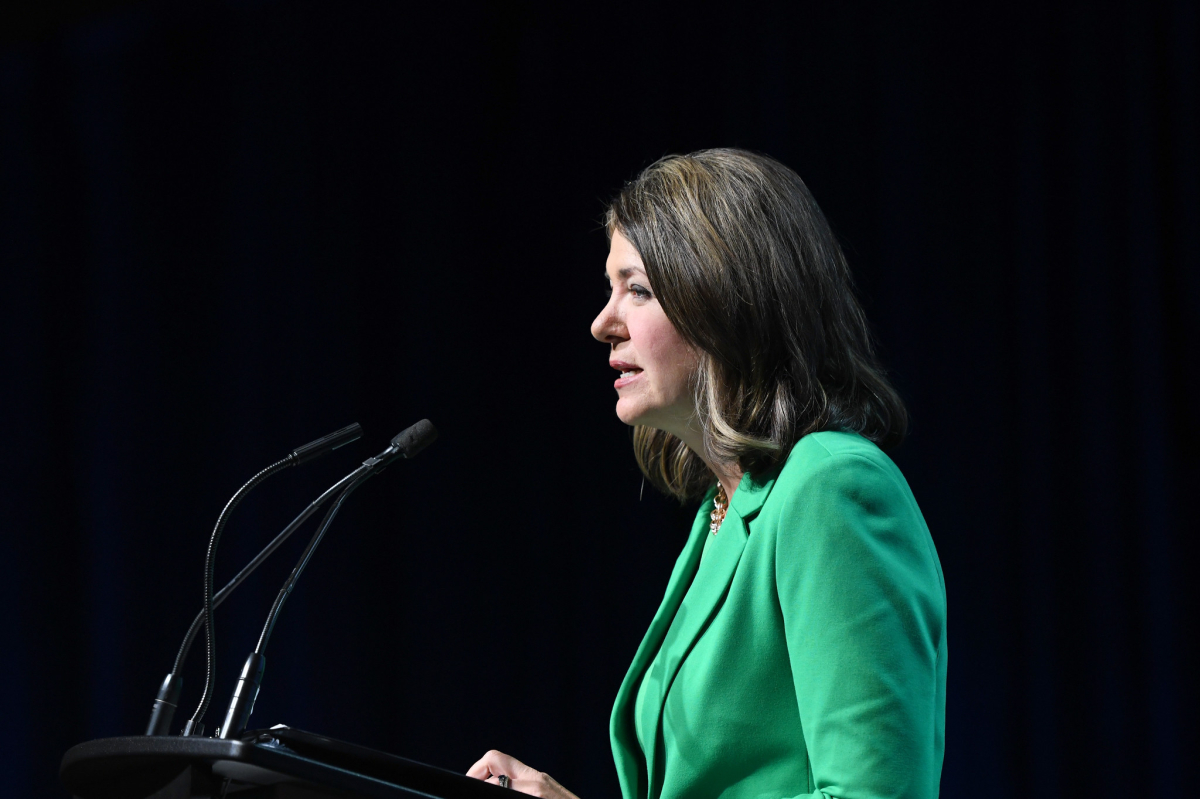Support strong Canadian climate journalism for 2025
Disinformation, along with Alberta Premier Danielle Smith’s enthusiasm for natural gas, powers her government’s perspective on generating electricity. For a month now, the seven-month moratorium Alberta’s United Conservative Party government slapped on large renewable energy project approvals has been lambasted by critics.
But several important justifications for the government’s draconian decision have largely escaped attention. One is that the province’s project approval process doesn’t pay enough attention to the concerns of rural municipalities. Regulators don’t welcome them; regulators don’t listen to them.
The Alberta Utilities Commission (AUC), the quasi-judicial agency responsible for approving power generation applications in Alberta, is the regulator here. It determines whether proposed projects are “in the public interest, having regard to the social and economic effects of the development…and the effects of the development…on the environment.”
An examination of the AUC approvals during the recent renewables investment boom shows there is no foundation for the UCP clampdown. The government’s action is based on disinformation, plain and simple.
Since June 1, 2019, the commission has considered 77 applications for new wind and solar facilities on non-First Nation lands. Strikingly, rural municipalities rarely sought to participate in these AUC proceedings and registered to intervene only 11 times.
More tellingly, categorical or strong opposition to renewable projects was rarer still. Municipalities only asked the AUC to reject two projects, the Foothills and Vauxhall solar project applications. In both cases, municipal opposition was based on the objection to taking agricultural land out of production and posting financial security for future reclamation.
The AUC rejected the Foothills project on environmental grounds, protecting Foothills County’s agricultural land base. In the Vauxhall case, the company satisfied the Municipal District of Taber’s concerns over losing prime agricultural land to the project. But the proponent refused to post a security deposit, and the district maintained its opposition. Nonetheless, the project was approved by the AUC.
In three other cases where municipalities intervened, most concerns were satisfied entirely or largely by solar power developers. In five other decisions, municipalities failed to submit any evidence after the AUC accepted their requests to participate in a hearing. In the 11th case, the county wrote to the AUC to offer background information and some “friendly suggestions for the applicant to consider.”
The record of renewable energy approvals could hardly be more devastating to the claim that municipalities have been ignored. Maybe, though, the record looks the way it does because the AUC’s rules and procedures discriminate against municipal participation.
Rubbish. If the AUC concludes a municipality has no legal right to participate, it may still use its discretion to grant municipalities full participation rights or the ability to submit written evidence. A review of applications since June 2019 shows this has been the norm.
The approvals record supports the commission’s claim that it “encourages, appreciates and values municipal involvement and input in its regulatory decision-making process.”
Municipalities haven’t participated in the regulatory process because they’ve shown little to no interest in doing so. Smith’s government is trying to sell the public a bill of goods when it suggests the AUC’s approvals process hasn’t responded fairly to municipal voices.
Money helps explain municipal silences and support. What the UCP didn’t tell Albertans when it clamped down on renewables approvals was that these projects make valuable contributions to municipal finances. Even Smith’s pro-oil and gas “war room” has acknowledged this. The Canadian Energy Centre reports that Vulcan County, for example, will receive approximately $3 million annually from the $700-million Travers Solar Project. The county’s chief administrative officer welcomed such developments because “they make up for a shortfall in our [tax] assessment.”
The disinformation Smith’s government is serving the public in spades has been with us for as long as we’ve engaged in politics. It erodes the quality of democratic life and should be called out whenever we discover it.
Ian Urquhart is a professor emeritus of political science at the University of Alberta. His teaching and research there focused on the political economy of natural resource exploitation and climate change.






Comments
And at least the renewables projects pay their damn taxes, unlike the oil boys apparently.
Nor do they clean up their abandoned oil wells as stipulated in their agreements. Albertans will end up footing the bill in the end, while at the same time, lose out on jobs with renewables and future job security.
I'll bet another toonie that Smith et al will try to goad Trudeau et al to contribute to the clean up. Canadians at large will have the impetus to angrily reject Smith's demands in that regard, and to be outraged if Trudeau actually caves.
This just further supports what I have been saying for some time now, Danielle Smith is just plain & simple batshit crazy, as is the UCP. Smith works for and is a plant by the oil & gas industry to serve them and has no interest in what is best for Albertans long term. The UCP and AUC are in bed with oil & gas and this will have long term impacts not only to Alberta, but Canada.
I don't understand why Albertans can't see the forest for the trees, but just consume the non-stop disinformation spewed by Smith, the UCP and AUC. It seems Albertans have consumed way too much UCP Kool-Aid to know the difference between fact and fiction. The fact they talk about separation at times, show how the UCP has convinced their base that the rest of Canada is out to get them. Little do they know; their own government is screwing them over and their future.
I have given up on why rural Albertans especially, put the votes to Conservative.
Smith not only selling us a bill of goods on renewables, she is doing it for education, Secondary education, health, and laboratory services. The crunch will come as heavy oil loses its lustre. A disservice to our younger folks who need a source of reliable, well paying and regular shift jobs, which renewables provide